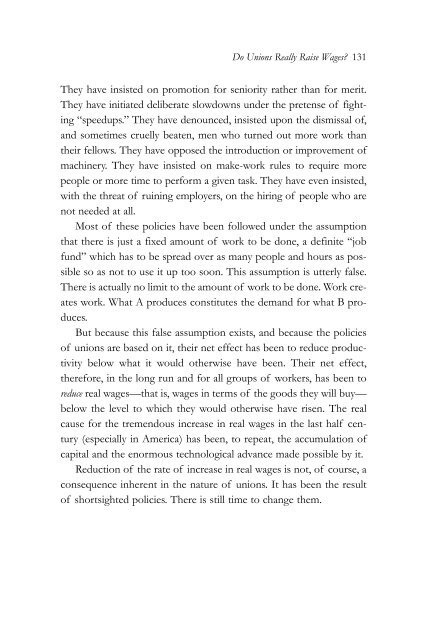- Page 2:
Economics in One Lesson
- Page 9 and 10:
viii Economics in One Lessonsubject
- Page 11 and 12:
x Economics in One LessonWhen it ca
- Page 13 and 14:
xii Economics in One Lessonnow pass
- Page 15 and 16:
xiv Economics in One Lessonbe fully
- Page 18 and 19:
CHAPTER 1The Lesson1Economics is ha
- Page 20 and 21:
The Lesson 5policies may become evi
- Page 22:
The Lesson 7are illustrated by exam
- Page 26 and 27:
CHAPTER 2The Broken WindowLet us be
- Page 28 and 29:
CHAPTER 3The Blessings of Destructi
- Page 30 and 31:
The Blessings of Destruction 15beca
- Page 32 and 33:
CHAPTER 4Public Works Mean Taxes1Th
- Page 34 and 35:
Public Works Mean Taxes 19absolutel
- Page 36 and 37:
Public Works Mean Taxes 21a lump su
- Page 38 and 39:
CHAPTER 5Taxes Discourage Productio
- Page 40 and 41:
CHAPTER 6Credit Diverts Production1
- Page 42 and 43:
Credit Diverts Production 27whole c
- Page 44 and 45:
Credit Diverts Production 29a chari
- Page 46 and 47:
Credit Diverts Production 31The pri
- Page 48 and 49:
CHAPTER 7The Curse of Machinery1Amo
- Page 50 and 51:
The Curse of Machinery 35If the rea
- Page 52 and 53:
The Curse of Machinery 37Mr. Edward
- Page 54 and 55:
The Curse of Machinery 39long run t
- Page 56 and 57:
The Curse of Machinery 41argued, fo
- Page 58:
The Curse of Machinery 43Yes, we sh
- Page 61 and 62:
46 Economics in One LessonCommittee
- Page 63 and 64:
48 Economics in One Lessondo make t
- Page 65 and 66:
50 Economics in One Lessonwork coul
- Page 67 and 68:
52 Economics in One Lessonthe case
- Page 69 and 70:
54 Economics in One Lessonsupport n
- Page 71 and 72:
56 Economics in One Lessonconsequen
- Page 74 and 75:
CHAPTER 11Who’s “Protected” b
- Page 76 and 77:
Who’s “Protected” by Tariffs?
- Page 78 and 79:
Who’s “Protected” by Tariffs?
- Page 80 and 81:
Who’s “Protected” by Tariffs?
- Page 82 and 83:
Who’s “Protected” by Tariffs?
- Page 84 and 85:
CHAPTER 12The Drive for ExportsExce
- Page 86 and 87:
The Drive for Exports 71would think
- Page 88:
The Drive for Exports 73Bad loans a
- Page 91 and 92:
76 Economics in One Lessonlaw; and
- Page 93 and 94:
78 Economics in One Lessonfrom indu
- Page 95 and 96: 80 Economics in One Lessonimpositio
- Page 98 and 99: CHAPTER 14Saving the X Industry1The
- Page 100 and 101: Saving the X Industry 85with a sing
- Page 102: Saving the X Industry 87they are mo
- Page 105 and 106: 90 Economics in One Lessonthe effic
- Page 107 and 108: 92 Economics in One Lessonmake that
- Page 109 and 110: 94 Economics in One Lessonup mounta
- Page 112 and 113: CHAPTER 16“Stabilizing” Commodi
- Page 114 and 115: “Stabilizing” Commodities 99pro
- Page 116 and 117: “Stabilizing” Commodities 101eq
- Page 118: “Stabilizing” Commodities 103wh
- Page 121 and 122: 106 Economics in One Lessoncost. Le
- Page 123 and 124: 108 Economics in One Lessonrationed
- Page 125 and 126: 110 Economics in One Lessonpower, i
- Page 127 and 128: 112 Economics in One Lessonor stop
- Page 130 and 131: CHAPTER 18Minimum Wage Laws1We have
- Page 132 and 133: Minimum Wage Laws 117except by payi
- Page 134: Minimum Wage Laws 119efficiency on
- Page 137 and 138: 122 Economics in One Lessonhim? And
- Page 139 and 140: 124 Economics in One Lessonprofessi
- Page 141 and 142: 126 Economics in One LessonThe unem
- Page 143 and 144: 128 Economics in One Lessonwhole co
- Page 145: 130 Economics in One Lessonbalance,
- Page 149 and 150: 134 Economics in One LessonThe doct
- Page 151 and 152: 136 Economics in One Lessonif monet
- Page 153 and 154: 138 Economics in One Lessonotherwis
- Page 156 and 157: CHAPTER 21The Function of ProfitsTh
- Page 158 and 159: The Function of Profits 143make it,
- Page 160 and 161: CHAPTER 22The Mirage of Inflation1I
- Page 162 and 163: The Mirage of Inflation 147once; on
- Page 164 and 165: The Mirage of Inflation 149lead mer
- Page 166 and 167: The Mirage of Inflation 151the over
- Page 168 and 169: The Mirage of Inflation 153sophisti
- Page 170 and 171: The Mirage of Inflation 1556And thi
- Page 172: The Mirage of Inflation 157will be
- Page 175 and 176: 160 Economics in One Lessonand the
- Page 177 and 178: 162 Economics in One Lesson“Savin
- Page 179 and 180: 164 Economics in One Lessonon the e
- Page 181 and 182: 166 Economics in One Lessoneach yea
- Page 183 and 184: 168 Economics in One Lessoneach oth
- Page 185 and 186: 170 Economics in One Lessonof capit
- Page 188: Part Three: The Lesson Restated
- Page 191 and 192: 176 Economics in One Lessonanswer a
- Page 193 and 194: 178 Economics in One Lessonto creat
- Page 195 and 196: 180 Economics in One LessonThis doe
- Page 197 and 198:
182 Economics in One Lessontemporar
- Page 200 and 201:
IndexAmerican AAA plan, 79American
- Page 202 and 203:
Index 187interest rates and savings
- Page 204:
Index 189wage laws, viii-ix, 115-19


